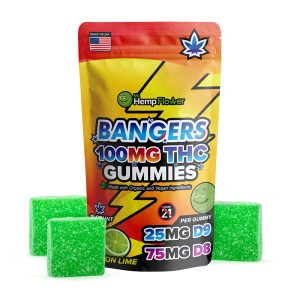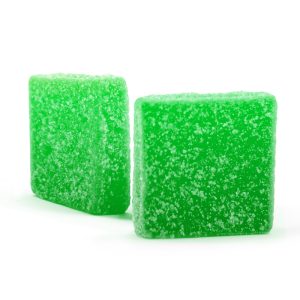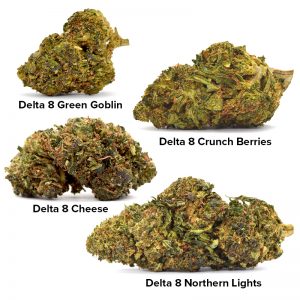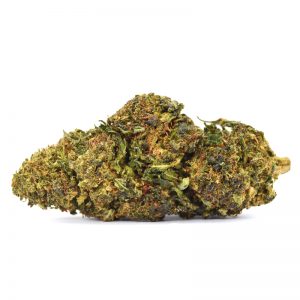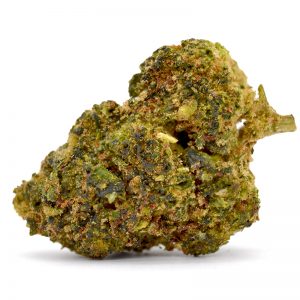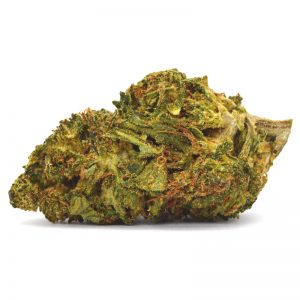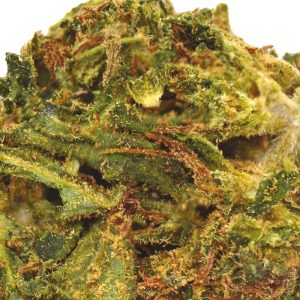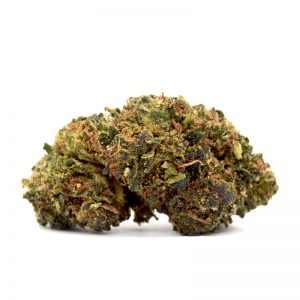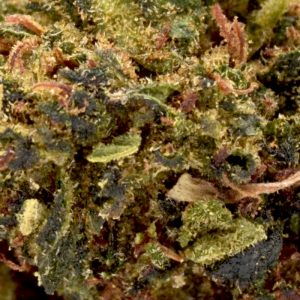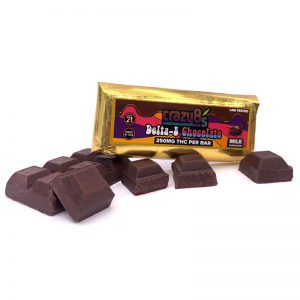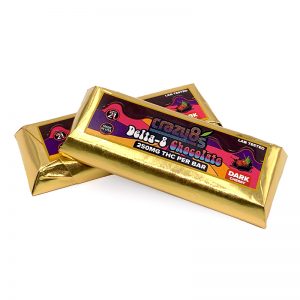What is Delta-8 THC? Should you try it? In this guide, we address all of the myths and truths behind delta-9 THC’s legal ‘sister cannabinoid.’
- What is delta-8 THC?
- Differences and similarities between delta-8 THC and delta-9 THC
- How is delta-8 THC derived from hemp?
- How is delta-8 THC consumed?
- Will Delta-8 THC get you high?
- What are the benefits of delta-8?
- Will you fail a drug test after consuming delta-8?
- Is delta-8 THC legal?
- Can I resell delta-8 THC at my store?
- Where can I buy delta-8 THC?
Delta-8 THC is a rare hemp cannabinoid that naturally occurs in cannabis in trace amounts — less than 1% — and is generally obtained through chemical synthesis. Like cannabinol (CBN), delta-8 THC is a THC degradation product that occurs when cannabis is exposed to long-term storage and aging. This minor cannabinoid is considered a milder version of delta-9 THC. Are you interested in trying delta-8 THC products? Here is everything you need to know about the benefits, uses, and legality of this cannabinoid.
What is Delta-8 THC?
link to topThe National Cancer Institute defines delta-8 THC as: “An analogue of tetrahydrocannabinol (THC) with antiemetic, anxiolytic, appetite-stimulating, analgesic, and neuroprotective properties. [Delta-8-THC] binds to the cannabinoid G-protein coupled receptor CB1, located in the central nervous system…This agent exhibits a lower psychotropic potency than [delta-9-THC], the primary form of THC found in cannabis.”It’s is naturally produced in the hemp plant through the process of biosynthesis of cannabinoids. Enzymes convert the “mother” of all cannabinoids, cannabigerolic acid (CBGA), into THC’s precursor, tetrahydrocannabinolic acid (THCA). During the process of decarboxylation (applying heat), THCA turns into delta-9 THC, which through the aging process, transforms into delta-8 THC. It was discovered in the early 1970s and has been subject to multiple clinical tests that discovered the cannabinoid’s potentially powerful medical use. The reason it’s not as popular as delta-9 or CBD — despite being psychotropic — is that it’s only present in cannabis in the concentration of a fraction of a percent. Delta-8 THC typically makes about 0.01% of the cannabis plant. So, the only way to use it for therapeutic purposes is through highly concentrated products. Modern growers and extractors have developed different breeding and extraction techniques to access greater quantities of this cannabinoid naturally.
Delta-8 vs. Delta-9: What’s The Difference?
In terms of chemical similarities, delta-8 and delta-9 THC are very similar compounds. The only difference between the two is in the location of their double bonds. Essentially, delta-8 THC is an analog of delta-9 THC — tetrahydrocannabinol (THC) has various structural forms known as chemical analogs. An analog is a compound with a similar structure to the one of another compound, but different in certain aspects. In this case, delta-8 and delta-9 are double bond chemicals — hence the delta in their names — with the only difference in the location of their carbon atoms. Namely, delta-9 THC has a double bond on the 9th carbon of the chain, whereas delta-8 has it on the 8th. The location of the double bond is important because it means that both components interact differently with the endocannabinoid system. As a (mildly) psychotropic cannabinoid, delta-8 THC interacts with the CB1 receptor in the nervous system. The CB1 receptor is responsible for the psychotropic effects produced by cannabis compounds — including the well-researched delta-9. Similarly to delta-9, delta-8 THC has neuroprotective effects and produces relief from nausea, anxiety, and pain. Delta-8 also binds with the CB2 receptors, which have a role in regulating the immune system [1]. Another difference between delta-9 and delta-8 THC is in their psychotropic effects — delta-8 doesn’t give the same mental stimulation delta-9 does. According to research, delta-8 THC is the two-thirds of the potency of delta-9 and gives a more clear-minded high with a lot less anxiety — even if taken in higher doses [1].
How Is It Derived From Hemp?
Because delta-8 THC occurs in trace amounts in hemp, it’s generally obtained by chemical synthesis. Getting a substantial amount of delta-8 THC means using specialized extraction, conversion, isolation, and refinement processes. There are several methods to do that, but the most feasible one is to convert cannabidiol (CBD) into delta-8 THC, which gives higher yield and purity than other methods. The process involves various steps and scientific equipment that allow extractors to purify and isolate the specific component without residual solvents and impurities. The end-products are refined and clean, with a high concentration of delta-8 THC [1].
Mr. Hemp Flower’s Difference
At Mr. Hemp Flower, our delta-8 distillate is made using an advanced ethanol extraction — an organic method commonly used in food and medicine. Once we have the crude, we use short path distillation and filtration to achieve the final delta-8 distillate. Ethanol extraction is classified as GRAS or “Generally Recognized as Safe” by the Food and Drug Administration (FDA).We chose ethanol because it is a solvent created by plants and is considered the safest option around. Most importantly, ethanol is the only solvent that maintains the original cannabinoid rations present in the specific strain. Speaking of, the cannabinoid ratio of the delta-8 distillate can vary slightly based upon each production run. Also, each strain has certain cannabinoids that are more predominant than others.
How is Delta-8 Consumed?
 There are several ways to consume delta-8 THC, and the most common one is via vape cartridges. That said, you can only consume delta-8 THC through products with a high concentration of the cannabinoid. Vape carts are a pure concentrated product that delivers a great taste of delta-8 THC. The second best method is sublingual options, administered and absorbed under the tongue, such as oils and tinctures.
There are several ways to consume delta-8 THC, and the most common one is via vape cartridges. That said, you can only consume delta-8 THC through products with a high concentration of the cannabinoid. Vape carts are a pure concentrated product that delivers a great taste of delta-8 THC. The second best method is sublingual options, administered and absorbed under the tongue, such as oils and tinctures.
What about smoking delta-8 THC rich hemp flower? There is no naturally occurring delta-8 THC rich hemp flower that you buy and smoke because this cannabinoid occurs in very low quantities in hemp — and its effects are not noticeable. However… you know that our team goes above and beyond to deliver the absolute best hemp products and that keep you pain-free, relaxed, and clear-headed every day. That’s why we started our unique product line that includes delta-8 pre-rolls and delta-8 CBD flower manufactured to include high levels of this cannabinoid. You can now smoke hemp delta-8 products and feel the difference offered by the potent delta-8.
Mr. Hemp Flower’s Delta 8 THC Product Line
It can be challenging to find amazing delta-8 THC products locally — so the best way of obtaining them is online. Choose your delta-8 product from our newest collection, and you won’t be disappointed in their quality or flavor:
- Delta-8 THC Vape Carts – our vape carts are 100% natural, lab-tested products for which we offer various terpene flavors. Spice it up with some of our original delta-8 terps flavors, including sativa (Sour Diesel and Cannalope Haze terpene blend), indica (Grandaddy Purple and Blue Cheese terpene blend), and hybrid (Cookies terpene blend).
- Delta-8 smokable CBD flower – It’s a thing, and we promise you, you won’t be disappointed. A cannabinoid powerhouse, our delta-8 hemp CBD flower comes in at 49mg/g delta-8 THC, 99mg/g CBDa, 2.17 mg/g CBGa, and 15mg/g CBCa.
- Delta-8 Pre-roll – this incredible pre-roll — a mix of delta-8 THC and cannabidiol (CBD) blended with kief — will become your new favorite item. Our delta-8 CBD pre-rolls are 100% pure and organic hemp and come in at whooping 39.30mg/g delta-8 THC and 84.30mg/g CBDA.
- Delta-8 THC Gel Capsules – each gel capsule contains 10 mg of delta-8 and is perfect for non-smokers that want to reap the healing benefits of this rare cannabinoid.
Does D-8 Get You High? What are the Effects?
Delta-8 THC will get you high, but in a different way than delta-9 THC. For the most part, delta-8 produces similar psychotropic effects as delta-9 THC, but is considered to be 50% less potent than delta-9 THC. In some cases — it has been shown to be 3-10 times less potent [1]. The psychoactive strength of delta-8 is more significant than tetrahydrocannabivarin (THCV). THCV is considered responsible for the energetic high induced by some cannabis strains, and it displays about 25 percent of THC’s potency [1].The fact that delta-8 THC is way less potent than delta-9 THC makes this component suitable for many people that are into a more semi-sedative physical sensation that stimulates appetite, but doesn’t cause the “munchies.” Although delta-8 THC will give you the classic feeling of being “stoned,” the lower psychotropic potency of delta-8 THC is apparent, especially if you’ve tried marijuana before.Users usually describe the “high” as a clear-headed high that didn’t allow them to lose focus or control. Basically, it gives a calm focus and a less intense, enjoyable, and manageable high.
What Are the Benefits of D-8?
More research is needed in the field of cannabis, but some evidence-based studies will leave you impressed with the benefits of delta-8 THC. Similarly to delta-9 THC, delta-8 THC binds with the CB1 receptor located in the central nervous system to produce psychotropic effects. It is believed that delta-8 THC also binds with CB2 receptors and protects the immune system. This cannabinoid exhibits antiemetic, anxiolytic, appetite-stimulating, analgesic, and neuroprotective properties. Let’s take a look at the amazing benefits of delta-8 THC [1]:
Potent Anti-emetic
Arguably the biggest benefit is that it’s a powerful antiemetic — it helps with nausea and vomiting. These two symptoms are common in patients undergoing treatments for serious conditions, such as chemotherapy. A 1995 study by world-renowned cannabis scientist Dr. Raphael Mechoulam used delta-8 THC for nausea and vomiting after chemotherapy treatment in children. Compared to delta-9 THC, delta-8 THC has been shown to be 200% more effective an anti-emetic than delta-9 THC. The study had an extremely positive outcome, and the side-effects were negligible [1].
Potent Appetite Stimulant
Although research is scarce, it has shown to help with loss of appetite. A 2004 animal study revealed that very low doses caused increased food consumption in mice, without the side-effects caused by cannabis [1].
Anxiolytic Properties
Many users report feeling anxious or paranoid after consuming delta-9 THC. With delta-8 THC, it’s a different story. The psychoactive effects of this compound are described as more mild and relaxing, but uplifting and alert at the same time. Users who don’t like the anxiety effects caused by delta-9 THC are turning to delta-8 THC, which gives them an energetic high that helps them stay focused while performing daily tasks.
Neuroprotective Properties
Although more research is needed in this area, but it may have neuroprotective properties. One mice study found that delta-8 THC increased the levels of acetylcholine in the brain. Acetylcholine is a neurotransmitter that plays an important role in learning and memory, and lower levels of this neurotransmitter are associated with conditions that cause memory loss and related symptoms [1].
May Help with Hangovers
Delta-8 is getting the recognition it deserves, but we need more research on its effects on humans. Some anecdotal evidence shows that delta-8 THC helps with hangovers. Delta-8 is an energizing compound that leaves the user clear-headed. There is no euphoric high that gives a heavy feeling, so in many, it helps with hangover nausea.
Will You Fail a Drug Test?
Yes, you will most likely fail a drug test after consuming delta-8 THC. The reason for that is that a standard drug test is likely to detect delta-8 THC and its metabolites. A standard urine drug test may even have a lower cutoff level of delta-8 THC compared to delta-9 THC, like this one. The cutoff level is the concentration of the compound in fluid that’s required for the test to be positive. In the example test, the cutoff level of the main delta-9 THC metabolite is 50ng/mL, while the delta-8 THC metabolite is detected at 30ng/mL. The length of time a chemical stays in the body depends on several factors, including:
- Amount of body fat a person has
- Frequency of consumption of the component
- Whether the user is combining different components
- The sensitivity of the drug test (more sensitive tests can detect lower doses)
Is Delta-8 Legal?
There is a lot of discussion on the legality of delta-8 THC, as the cannabinoid has gotten more recognition. According to Rod Knight, an international hemp lawyer, delta-8 THC from hemp is not a controlled substance on a federal level. That is, naturally occurring delta-8 in hemp falls under the legal definition of hemp under the 2018 Farm Bill. Hemp and any part of that plant, including “cannabinoids,” “derivatives,” “extracts,” and “isomers” are legal and not controlled substances. Hence, delta-8 is a hemp “cannabinoid” and not a controlled substance. Another aspect of the legality is that the compound is mostly manufactured from other hemp cannabinoids, like delta-9 THC and cannabidiol (CBD). Most of the products on the market are derived from cannabidiol (CBD) — most hemp cultivars don’t have sufficient concentration of delta-8 THC. As a hemp cannabinoid, hemp CBD falls under the legal definition of hemp as the Farm Bill makes no distinction between the hemp plant and its cannabinoids. So, when delta-8 THC is derived from hemp CBD, it meets the definition of hemp “derivatives,” which have been removed from the Controlled Substances Act (CSA). There are no current regulations for hemp-derived delta-8 THC in place. So, the legality of the compound may depend on the type of product you use. Check your state’s law on smokable hemp flower and vaping before buying delta-8 THC products.
The following states have fully banned or restricted the manufacture, distribution, and sale of hemp-derived Delta-8 THC and similar THC isomers.
- Alaska – The state classifies tetrahydrocannabinols as Schedule IIIA controlled substances. Although recreational cannabis is legal in Alaska, the ban doesn’t come as a huge surprise considering most adult-use states regulated tetrahydrocannabinol products as part of their legal cannabis system.
- Arizona – The state has banned any form of tetrahydrocannabinol and lists cannabis as a Schedule I drug.
- Arkansas – Under Arkansas law, tetrahydrocannabinols and any salts, isomers, or salts of isomers of THC are classified as a Schedule VI substance. House Bill 1415 specifies that synthetic substances, derivatives, and their isomers with a similar structure to classified substances are also considered illegal.
- Colorado – In a May 2021 statement, the state’s Department of Public Health and Environment declared that “chemically modifying or converting” hemp-derived cannabinoids that naturally occur in the plant is non-compliant with the statutory definition of ‘industrial hemp product.’”
- Connecticut – As of July 1, 2021, unlicensed businesses in Connecticut are not allowed to sell hemp-derived Delta-8 products with a THC concentration of above 0.3 percent. State Legislators passed an Act that made changes to regulation and closed the Delta-8 THC loophole.
- Delaware – The state’s Uniform Controlled Substances Act prohibits the manufacture and sale of any product containing “any quantity of marijuana or any tetrahydrocannabinol and their isomers that the Food and Drug Administration (FDA) hasn’t approved. Delta-8 THC is not FDA approved and is therefore illegal in Delaware.
- Kentucky – In April 2021, the Kentucky Department of Agriculture sent a letter to hemp license holders explaining the illegality of D-8 THC on state and federal level. Kentucky law effectively outlaws all isomers of THC in House Bill 307, including D-8 THC.
- Idaho – The state bans all tetrahydrocannabinols, except for those occurring in hemp with less than 0.3 percent THC. As a conservative state with strict views towards cannabis, Idaho specifically outlaws all synthetic substances, derivatives, and isomers with a similar structure to THC molecules.
- Iowa – The state has no medical marijuana program and holds more restrictive legislation surrounding tetrahydrocannabinols and its isomers. Therefore, all tetrahydrocannabinols, isomers, and synthetic equivalents are banned in the state.
- Michigan – As of October 11, 2021, Delta-8 THC and other tetrahydrocannabinol isomers will be regulated under the state’s cannabis program and Marijuana Regulatory Agency. Delta-8 and other THC isomers and banned from unlicensed retail stores.
- Mississippi – Another state with strict views towards cannabis that bans all isomers, derivatives, and synthetic substances of tetrahydrocannabinols.
- Montana – In Montana, all salts, derivatives, isomers, and synthetic substances replicating tetrahydrocannabinols are controlled substances.
- New York – In May 2021, the state issued a regulatory proposal ban that prohibits the sale of Delta-8 THC. In New York, processors may “not use synthetic cannabinoids, or Δ8-tetrahydrocannabinol or Δ10-tetrahydrocannabinol created through isomerization, in the extraction or manufacturing of any cannabinoid hemp products.”
- North Dakota – State Legislators passed HB 1045 into law in April 2021, banning Delta-7, Delta-8, and Delta-10 THC.
- Oregon – Governor Kate Brown signed House Bill 3000 on July 19, 2021, which created a new category of “adult-use cannabinoids” such as Delta-8, Delta-9, and any intoxicating, artificially derived cannabinoid. The bill bans the sale of high-THC products to minors and allows state agencies to set potency limits on artificially derived cannabinoids like Delta-8 THC.
- Rhode Island – Rhode Island’s “Uniform Controlled Substances Act” classifies every isomer and derivative from “marijuana” as a controlled substance.
- Utah – The state’s Controlled Substances Act lists tetrahydrocannabinols and synthetic equivalents, derivatives, and isomers as controlled substances — including Delta-8 THC.
- Vermont – The state’s Agency of Agriculture released a statement in April 2021 that specified that the manufacture, possession, and sale of D-8 THC is illegal under state law because the component is “not naturally occurring.”
Delta-8 THC Friendly States
The following states nurture a friendly attitude and/or regulations towards Delta-8 THC:
- Alabama
- California
- Florida
- Hawaii
- Illinois
- Indiana
- Maine
- Maryland
- Massachusetts
- Minnesota
- Missouri
- Nevada
- New Hampshire
- New Jersey
- New Mexico
- North Carolina
- Ohio
- Oklahoma
- Pennsylvania
- South Carolina
- South Dakota
- Tennessee
- Texas
- Virginia
- Washington
- West Virginia
- Wisconsin
- Wyoming
States where hemp-derived Delta-8 THC is in a gray legal area
The following states either hold a more conservative view on cannabis (and have shown a more hostile attitude towards stores selling Delta-8 THC) or are in the process of restricting the cannabinoid.
- Georgia – The state has banned synthetic cannabinoids in 2010, which makes it a prime candidate to ban this THC isomer if deemed “synthetic.” Selling Delta-8 THC in Georgia became dangerous as law enforcement raided a few shops selling D-8 products.
- Louisiana – The Governor recently signed a new law (HB 640) that bans the use of ‘consumable hemp products’ that don’t contain naturally occurring cannabinoids. The bill also caps the amount of ‘Total THC’ in a product to 1%. The bill took effect on August 1, 2021, but its implementation is being debated.
- Kansas – Kansas was the first state to outlaw synthetic cannabinoids. As of this writing, the state hasn’t introduced any legislation concerning D-8 THC. Therefore, the legality of D-8 THC remains uncertain, especially if this compound is deemed a synthetic tetrahydrocannabinol.
- Nebraska – Up until March 30, 2021, Nebraska was one of the states
Disclaimer: This article is intended for educational purposes only and is not meant to give legal advice. For legal advice on manufacturing or selling delta-8 THC products, please consult an attorney.
Can I Resell Delta-8 In My Store?
 As of this writing, there are no legal regulations specifically on delta-8 THC. That said, hemp is a legal plant federally, you can likely sell hemp-derived delta-8 THC products in your store. Another thing to consider when selling different delta-8 products is the type of product you are offering. Some states have “temporarily banned” the use of vape products altogether, while other states prohibit the sale and use of smokable hemp. States like Washington State and Montana issued temporary bans on flavored vape products for several months. The bans on vape products have been lifted, but it’s unclear whether they will be back. If the products you are selling are derived from marijuana, you can sell them in states that have legalized marijuana for recreational purposes — or states where legal marijuana dispensaries sell THC products for medical purposes.
As of this writing, there are no legal regulations specifically on delta-8 THC. That said, hemp is a legal plant federally, you can likely sell hemp-derived delta-8 THC products in your store. Another thing to consider when selling different delta-8 products is the type of product you are offering. Some states have “temporarily banned” the use of vape products altogether, while other states prohibit the sale and use of smokable hemp. States like Washington State and Montana issued temporary bans on flavored vape products for several months. The bans on vape products have been lifted, but it’s unclear whether they will be back. If the products you are selling are derived from marijuana, you can sell them in states that have legalized marijuana for recreational purposes — or states where legal marijuana dispensaries sell THC products for medical purposes.
Where Can I Buy Delta-8?
The best place to find quality delta-8 THC products is online. Mr. Hemp Flower offers Delta-8 Vape Carts, smokable hemp flower and hemp pre-rolls sprayed with highly concentrated delta-8 THC, and delta 8-THC gel capsules. Vape carts are easy to use, almost effortless compared to dab rings and other methods of consuming delta-8. They also offer a highly controlled dose, which allows you to start low and increase gradually. Our delta-8 THC products are potent and refined — check out the labs for our hemp CBD flower and pre-rolls enriched with delta-8 — they are packed with incredible cannabinoids and terpenes.
FAQs on Delta-8 THC: Everything You Need to Know
Will Delta 8 get me high?
Delta-8 THC is about 50% less psychotropic than delta-9 — but it will get you high. The thing is, delta-8 produces a calmer and enjoyable high, which most people prefer.
Is delta 8 legal?
Hemp-derived delta-8 THC is legal because it’s considered a naturally occurring cannabinoid in hemp, or derived from a naturally occurring hemp cannabinoid like CBD. Marijuana-derived delta-8 THC is legal in states with recreational and medicinal cannabis laws.
Can I resell delta 8?
There are no specific rules and regulations on delta-8 THC. However, since hemp is a legal crop, you can resell hemp-derived delta-8 THC products.
Will delta 8 make me fail a drug test?
Most likely, it will. Standard drug tests detect the presence of THC metabolites, including delta-8 THC’s.
Will delta 8 help me sleep?
Delta-8 is said to produce a calming, relaxing high that’s not heavy on the body, so it might help you sleep.


